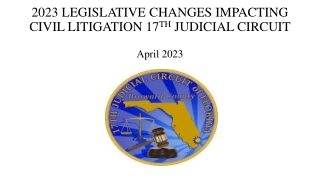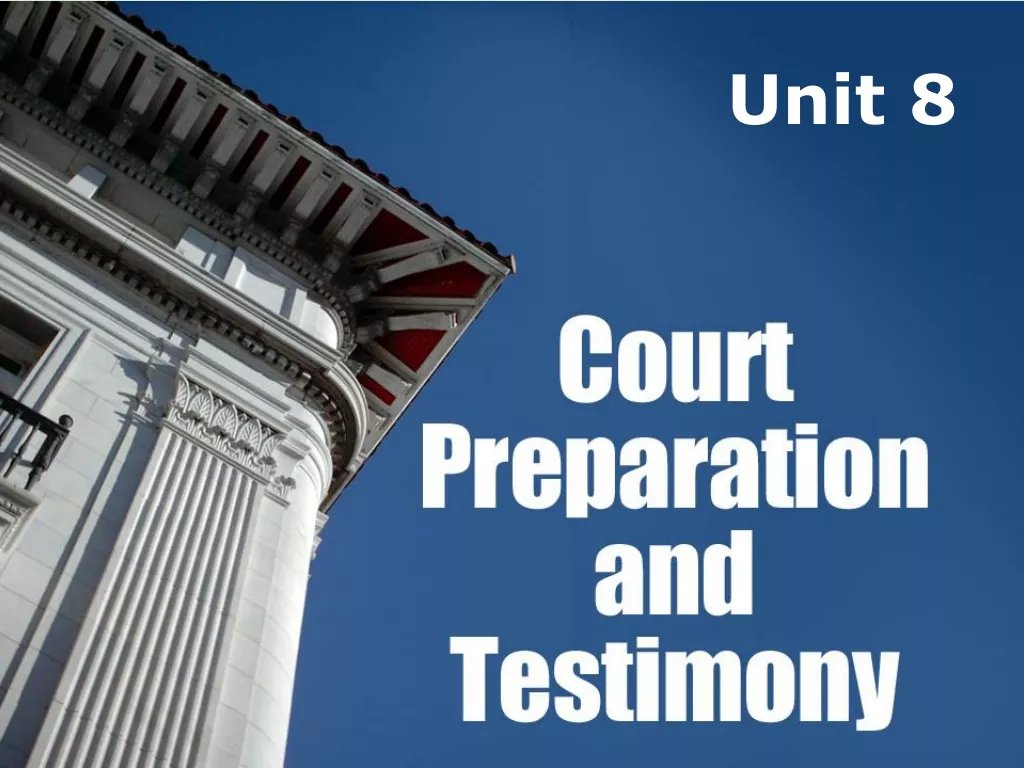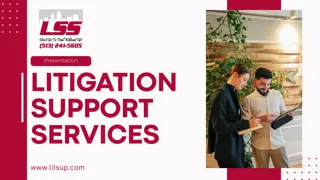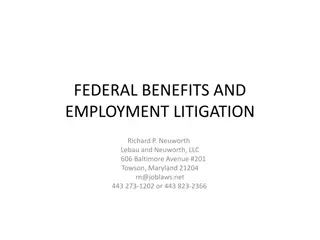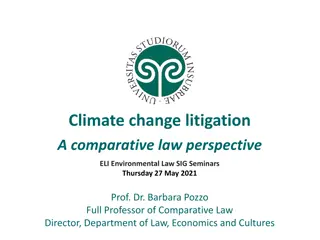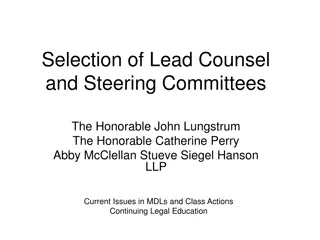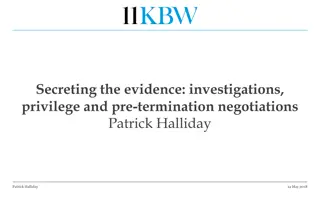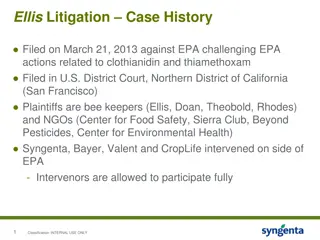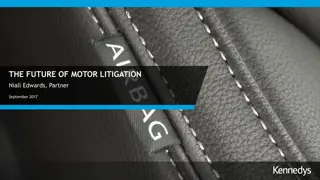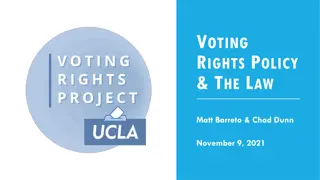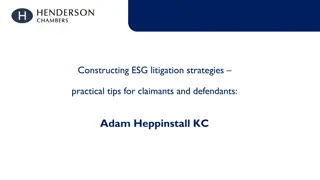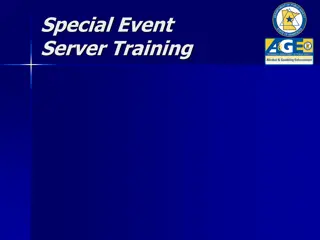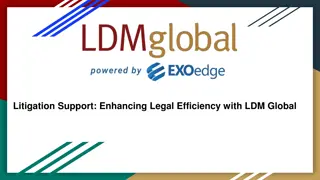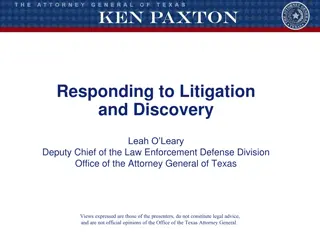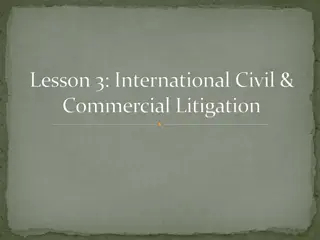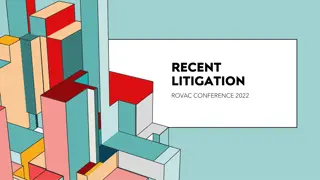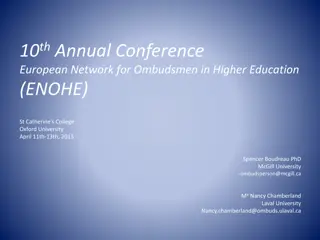Challenges in Managing Protests and Civil Litigation
The discussion revolves around issues such as separating protesting and counter-protesting groups, kettling or mass arrest/detention practices, and the use of force in managing protests. Legal cases and perspectives on crowd control measures are explored within the context of civil rights and law enforcement challenges.
Download Presentation

Please find below an Image/Link to download the presentation.
The content on the website is provided AS IS for your information and personal use only. It may not be sold, licensed, or shared on other websites without obtaining consent from the author. Download presentation by click this link. If you encounter any issues during the download, it is possible that the publisher has removed the file from their server.
E N D
Presentation Transcript
PROTESTS AND CIVIL LITIGATION Naomi Sheffield, Senior Deputy City Attorney, Portland, OR
SEPARATING COUNTER-PROTESTING GROUPS Policing Issue: Separate groups with competing beliefs protesting and counter-protesting. Conduct of these groups regularly leading to violence toward each other. Proposed Solution: Content Neutral Time, Place and Manner Restrictions Legal Analysis: Georgetown Institute On Constitutional Advocacy and Protection Policy Considerations: Unable to pass in Portland
KETTLING OR MASS ARREST/DETENTION Haber, et al. v. Portland, et al. (Ibarra v. City of Portland, et al.) Detained 435 People Not Arrested Acting as a collective unit Kettling: confinement by police of a group of demonstrators or protestors in a small area, as a method of crowd control.
KETTLING OR MASS ARREST/DETENTION Lyall v. City of Los Angeles, 807 F.3d 1178 (9th Cir. 2015) Ybarra does not, however, imply that police can never possess reasonable suspicion or probable cause unless it is individualized. Carr v. District of Columbia, 587 F.3d 401 (D.C. Cir. 2009) Police witnesses must only be able to form a reasonable belief that the entire crowd is acting as a unit and therefore all members of the crowd violated the law. A requirement that the officers verify that each and every member of a crowd engaged in a specific riotous act would be practically impossible in any situation involving a large riot. Bernini v. City of St. Paul, 665 F.3d 997 (8th Cir. 2012) What is reasonable in the context of a potential large-scale urban riot may be different from what is reasonable in the relative calm of a tavern with a dozen patrons.
KETTLING OR MASS ARREST/DETENTION But See Vodak v. City of Chicago, 639 F.3d 738 (7th Cir. 2011) No precedent should be necessary . . . To establish that the Fourth Amendment does not permit the police to say to a person go ahead and march and then, five minutes later, having revoked permission for the march without notice to anyone, arrest the person for having marched without police permission.
USE OF FORCE Less Discriminate Munitions: tear gas, flash bangs (RBDDs) More Discriminate: impact munitions, pepper spray, batons Don t Shoot Portland v. Portland (3:20-cv-00917-HZ) Tear Gas & COVID-19 Less Lethal Munitions (impact munitions, pepper spray, RBDDs) Contempt Black Lives Matter v. Seattle (2:20-cv-00887-RAJ) Tear Gas & Less Lethal Munitions Contempt Abay v. Denver (1:20-cv-01616-RBJ) Tear Gas & Less Lethal Munitions Anti-Police-Terror Project v. Oakland (3:20-cv-03866-JCS) Tear Gas & Less Lethal Munitions No Contempt
JOURNALISTS/LEGAL OBSERVERS/MEDICS Right of Access Index Newspapers v. Portland (3:20-cv-001035-SI) Arguments for: Recognition of the press to a special right of access as surrogates for the public. When wrongdoing is underway, officials have great incentive to blindfold the watchful eyes of the Fourth Estate. Leigh v. Salazar, 677 F.3d 892, 897 (9th Cir. 2012). Concerns: Defining and distinguishing special classes of persons. Engaging in other criminal activity challenging line drawing.
JOURNALISTS/LEGAL OBSERVERS/MEDICS Wise v. Portland (3:20-cv-01193-IM) Protest medics may continue to protest, and provide medical aid during the protests. They simply have no unique status under the First Amendment that allows them to disregard lawful orders. When Reporting Becomes a Defense for Rioting - https://www.newyorker.com/news/us-journal/when-reporting- becomes-a-defense-for-rioting
AMERICANS WITH DISABILITIES ACT Wolfe v. Portland (3:20-cv-1882-SI) Claims: Violation of ADA (42 U.S.C. 12131); Section 504 Rehabilitation Act; First Amendment; Fourth Amendment; Fifth and Fourteenth Amendment Due Process; Fifth and Fourteenth Amendment Equal Protection Preliminary Relief: Communication of orders: ASL interpreters and visual messaging systems Cease the use of bull-rushes or similar practices that do not allow sufficient time. Identify and inform protesters and others of accessible avenues of egress. Cease the use of chemical munitions Cease using strobe lights Cease separating people with disabilities from their assistants, interpreters, sighted guides and/or service animals
FEDERAL INTERFERENCE Federal Officers in Portland 40 U.S.C. 1315: Designating officers and agents for duty in connection with the protection of property owned or occupied by the Federal Government and persons on the property, including duty in areas outside the property to the extent necessary to protect the property and persons on the property. enforce Federal laws and regulations for the protections of person and property conduct investigations, on and off the property in question, of offenses that may have been committed against property owned or occupied by the Federal Government or persons on the property
FEDERAL INTERFERENCE Federal Officer Presence in Portland July 3 through July 28 Tear gas and other force ICE Facility continuing presence Fence & Cameras Erected in the City s right of way, blocking City streets and in City bike lanes without permission Cameras placed on City poles without permission Deputation PPB Officers Deputized as US Marshalls 28 CFR 0.112. Portland withdrawal; US Attorney refused to end the deputation Anarchist Jurisdictions (2:20-cv-01560-BHS)


